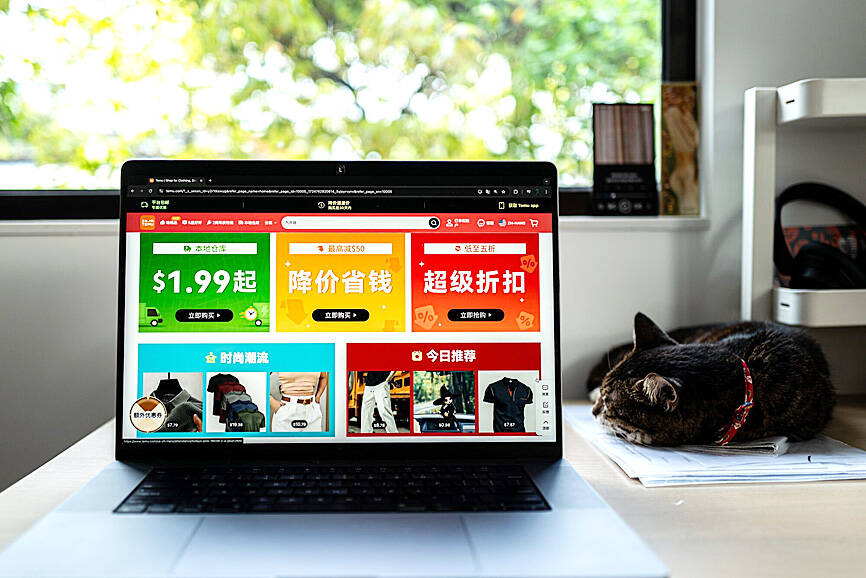PDD Holdings Inc’s (拼多多) shares fell the most on record after Temu’s owner warned that revenue growth would inevitably dwindle, highlighting the challenges of sustaining its pace of expansion against aggressive rivals like ByteDance Ltd (字節跳動).
Cofounder Chen Lei (陳磊) repeatedly stressed that PDD’s current trajectory was not sustainable, at a time competitors such as ByteDance’s TikTok and Alibaba Group Holding Ltd (阿里巴巴) are vying for budget-conscious shoppers.
PDD’s American depositary receipts on Monday tumbled 29 percent in New York, the stock’s worst loss since its initial public offering in 2018 and wiping out US$55 billion of market value.

Photo: Bloomberg
PDD has spent big on e-commerce business Temu to drive its global presence and escape an ailing Chinese economy.
However, executives have kept a lid on the overseas unit’s performance as competition turns cutthroat.
On Monday, Chen said PDD needed to invest more in supporting merchants — at a time rivals are trying to woo them away.
“Competition is here to stay and is expected to intensify in our industry,” Chen told analysts during a post-results briefing. “High revenue growth is not sustainable, and a downward trend in profitability is inevitable.”
The Chinese e-commerce platform, which became a market darling with low-priced goods that helped propel sales and profits during China’s economic downturn, reported revenue of 97.1 billion yuan (US$13.6 billion) for the April-to-June quarter, missing the average estimate of 100 billion yuan.
Its net income was 32 billion yuan, compared with a projected 27.5 billion yuan.
“Going forward, PDD will face fierce competition in China, with merchants going through a hard time,” said Wang Xiaoyan (王曉燕), a Shanghai-based analyst with 86Research.
“PDD will likely invest more in China, and that means we’ll see downside for the group in the Chinese market,” Wang said.
The company’s disappointing results were the latest in a series of red flags about the Chinese economy. This week, popular restaurant chain Din Tai Fung (鼎泰豐) said it was shutting 14 outlets in northern China. Last month, Starbucks Corp disclosed a 14 percent plunge in Chinese revenue in the June quarter.
“The big issue is weakness in China consumer,” Robeco Hong Kong Ltd’s head of Asia Pacific equities Joshua Crabb said. “The read-across for competition and a weak consumer will be negative for sure.”
Consumption, a main driver of the economy, weakened this year after a rebound in post-COVID-19 reopening spending last year. Against the backdrop of widespread job and salary cuts, as well as plunging property prices, Chinese consumers have become more cautious with their spending, leading to intense price wars in sectors such as cars.
Retail sales expanded just a little more than 3 percent in the first seven months of this year, far worse than the 8 percent-plus growth recorded in pre-pandemic times.
Residents’ confidence in future income plunged to the worst level since the end of 2022, a central bank survey conducted in the second quarter showed.

Sweeping policy changes under US Secretary of Health and Human Services Robert F. Kennedy Jr are having a chilling effect on vaccine makers as anti-vaccine rhetoric has turned into concrete changes in inoculation schedules and recommendations, investors and executives said. The administration of US President Donald Trump has in the past year upended vaccine recommendations, with the country last month ending its longstanding guidance that all children receive inoculations against flu, hepatitis A and other diseases. The unprecedented changes have led to diminished vaccine usage, hurt the investment case for some biotechs, and created a drag that would likely dent revenues and

Macronix International Co (旺宏), the world’s biggest NOR flash memory supplier, yesterday said it would spend NT$22 billion (US$699.1 million) on capacity expansion this year to increase its production of mid-to-low-density memory chips as the world’s major memorychip suppliers are phasing out the market. The company said its planned capital expenditures are about 11 times higher than the NT$1.8 billion it spent on new facilities and equipment last year. A majority of this year’s outlay would be allocated to step up capacity of multi-level cell (MLC) NAND flash memory chips, which are used in embedded multimedia cards (eMMC), a managed

CULPRITS: Factors that affected the slip included falling global crude oil prices, wait-and-see consumer attitudes due to US tariffs and a different Lunar New Year holiday schedule Taiwan’s retail sales ended a nine-year growth streak last year, slipping 0.2 percent from a year earlier as uncertainty over US tariff policies affected demand for durable goods, data released on Friday by the Ministry of Economic Affairs showed. Last year’s retail sales totaled NT$4.84 trillion (US$153.27 billion), down about NT$9.5 billion, or 0.2 percent, from 2024. Despite the decline, the figure was still the second-highest annual sales total on record. Ministry statistics department deputy head Chen Yu-fang (陳玉芳) said sales of cars, motorcycles and related products, which accounted for 17.4 percent of total retail rales last year, fell NT$68.1 billion, or

In the wake of strong global demand for AI applications, Taiwan’s export-oriented economy accelerated with the composite index of economic indicators flashing the first “red” light in December for one year, indicating the economy is in booming mode, the National Development Council (NDC) said yesterday. Moreover, the index of leading indicators, which gauges the potential state of the economy over the next six months, also moved higher in December amid growing optimism over the outlook, the NDC said. In December, the index of economic indicators rose one point from a month earlier to 38, at the lower end of the “red” light.